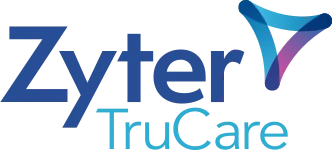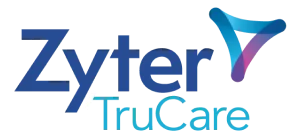- Shannon Smith, RN, BSN
As the Centers for Medicare & Medicaid Services (CMS) finalizes guidelines for streamlining prior authorization procedures, healthcare payers brace for substantial operational shifts. These regulations, set to take effect from January 1, 2026, through the year’s end, impose accelerated decision timelines and heightened information exchange standards among patients, providers, and payers. In this transformation landscape, Zyter|TruCare, armed with advanced utilization management tools, emerges as a strategic ally, uniquely positioned to assist healthcare organizations in meeting these new requirements efficiently and effectively.

Illustration by Mike Werner
Navigating New CMS Prior Authorization Requirements
Faster Decision Timelines: Healthcare entities are challenged to navigate an updated landscape of prior authorization requirements. One prominent alteration involves expeditious decision timelines, mandating a swift response from public payers, excluding Qualified Health Plans (QHPs). Urgent requests now necessitate prior authorization decisions within a stringent 72-hour period, while standard requests must be processed and resolved within seven calendar days. This acceleration underscores healthcare organizations need to streamline their prior authorization workflows to align seamlessly with these stringent timelines.
Specific Reasoning for Denials: Healthcare payers must provide specific and explicit reasons for denying prior authorization requests. This mandate is designed to introduce greater transparency into the denial process, ensuring that members and healthcare providers have clear insights into the rationale behind denials. The explicit reasoning catalyzes a more efficient and transparent process, allowing stakeholders to provide additional clinical information promptly or initiate an appeal if necessary. This shift underscores the importance of robust denial management strategies within healthcare organizations, aligning them with the CMS directive for enhanced communication and transparency in the prior authorization process.
Implementation of HL7 FHIR APIs: Effective January 2027, CMS mandates a comprehensive enhancement of Patient Access API by impacted payers, delving into intricate details of prior authorizations. Concurrently, a Provider Access API is poised to empower healthcare providers with unprecedented access to comprehensive patient information. This strategic move towards incorporating Health Level 7 (HL7) Fast Healthcare Interoperability Resources (FHIR) APIs positions healthcare entities in compliance with CMS guidelines and lays the groundwork for heightened interoperability. The envisioned result is a healthcare ecosystem marked by seamless information exchange, increased operational efficiency, and an elevated standard in electronic prior authorization procedures.
Enhanced Reporting Requirements: Effective immediately, payers are mandated to publicly report specific metrics related to prior authorization annually, with the inaugural reporting deadline set for March 31, 2026. This increased transparency reinforces accountability and fosters a more informed and engaged healthcare landscape. Moreover, the subsequent introduction of API metrics reporting in 2027 adds a layer of granularity to performance evaluations. As the reporting landscape evolves with these new rules, maintaining compliance becomes pivotal for payers to navigate the intricacies of prior authorization procedures and foster transparency within the healthcare ecosystem.
New Measure for MIPS Eligible Clinicians, Eligible Hospitals, and Critical Access Hospitals (CAHs): Introducing a new dimension to performance assessments, CMS has incorporated a distinct attestation measure, “Electronic Prior Authorization,” within the HIE objective. This measure requires eligible providers, including MIPS-eligible clinicians, eligible hospitals, and Critical Access Hospitals (CAHs), to report a simple yes/no response to submitting one request for a service/procedure or inpatient discharge and one medical item or service. This measure is scheduled to commence in the Calendar Year (CY) 2027 performance period for MIPS and CY 2029 MIPS payment year. Eligible hospitals and CAHs are set to begin reporting during the CY 2027 EHR reporting period, adding a strategic layer to the overall evaluation of healthcare providers’ adherence to electronic prior authorization standards.
Optimizing Utilization Management with Zyter|TruCare
Our recent advancements reflect a deep commitment to understanding and addressing the challenges faced by healthcare providers. By actively listening to feedback and translating it into practical solutions, we have shaped Zyter|TruCare into a tool that meets and surpasses our customers’ expectations.
Zyter|TruCare is dedicated to delivering solutions that tackle current challenges and anticipate future needs in the healthcare sector. Our focus on operational excellence is unwavering, as is our dedication to empowering healthcare providers. This commitment is instrumental in driving better patient outcomes and elevating the standard of healthcare administration.
Zyter|TruCare’s Role in Prior Authorization Transformation
Zyter|TruCare is advancing utilization management, effectively aligning with the new standards set by CMS with enhanced capabilities:
Robust Intake Channels: Zyter|TruCare accommodates multiple intake channels for Prior Authorization requests, including our Provider Portal Auth Entry tool, ProAuth, as well as integration with inbound fax applications and 278 feeds, and direct user entry for phone and non-integrated faxes. ProAuth provides many features that facilitate and uphold compliance with the standards of the new rule, including access to prior authorization requests for providers who have a relationship with a patient.
Advanced Artificial Intelligence Integration: Zyter|TruCare utilizes AI technologies to enhance the Utilization Management process. By employing Optical Character Recognition (OCR) technologies, TruCare can convert text from images, such as prior authorization forms, into editable formats. This extracted information is then processed by Generative AI technologies, which assist in creating summaries of documents and facilitating specific inquiries related to the document’s content. This approach improves information accessibility and boosts the process’s efficiency.
Seamless Process Management: Zyter|TruCare’s business rules engine allows for the creation of bulk or individual workflow tasks and efficient management of the authorization lifecycle, from entry to notification. This automation aligns with the need for more efficient processes mandated by CMS. Health Plans have complete control over the business rules engine at any time, allowing task turnaround times (TATs), assigned work queues, and task priority levels, among others, to be customized to their needs, ensuring compliance with the new rule. The business rules engine works with the TruCare and ProAuth applications, with specific regulations tailored to health plan users and providers.
Automated End-to-End Authorization Processing: Our platform supports automated approvals of authorizations, decreasing manual data entry and streamlining outbound calls and information requests. Our Correspondence rules engine works in conjunction with authorization processing. It can identify scenarios where a letter can be automatically generated in whole or created and send a task to a queue for letter completion. This automation creates opportunities for no-touch authorizations, freeing users to perform more valuable tasks.
System-Guided Workflows: Zyter|TruCare ensures proper utilization management and equitable decisions across the member base. Health Plans can create population-specific utilization management rules to align with required prior authorization lists for those needing medical necessity review or should be flagged for denial.
Authorization Pre-Screening: Our pre-screening feature within TruCare and ProAuth avoids unnecessary requests, saving time and resources. If the request is required, Zyter|TruCare has interoperability capabilities for clinical criteria and guidelines for medical necessity review, including IQConnect and MCG Cite AutoAuth within our Provider Portals. This integration brings the review in simultaneously as the provider’s request is received.
Interoperability and API Integration: Zyter|TruCare, in alignment with CMS’s HL7 FHIR API integration mandate, stands ready to assist health plans in seamlessly adopting these APIs. Our platform ensures efficient facilitation of electronic prior authorization processes, with ProAuth showcasing the ability to communicate authorization decisions. By providing a comprehensive overview of all authorizations linked to the provider and offering accessible correspondence for approval, including denial letters, Zyter|TruCare streamlines the integration process, contributing to a more connected and interoperable healthcare ecosystem.
Universe Reporting: Zyter|TruCare’s reporting solution, coupled with the expertise of our Business Consultancy staff, empowers healthcare organizations to achieve Universe reporting for ODAG and CDAG compliance seamlessly. Beyond meeting the requirements outlined in the final rule, our comprehensive reporting capabilities contribute to enhanced visibility and strategic decision-making, ensuring that healthcare providers can navigate the complex landscape precisely and confidently.
Maintaining Preparedness
The changes brought by CMS’s final rule on prior authorization are significant, but with Zyter|TruCare, healthcare payers and providers are well-equipped to meet these challenges. Our platform aligns with these new requirements and enhances operational efficiency, ensuring that healthcare organizations can focus on what truly matters – providing quality patient care. As the healthcare landscape evolves, Zyter|TruCare remains committed to delivering practical solutions that address current and future healthcare management needs.
Stay ahead in the rapidly changing healthcare landscape with Zyter|TruCare. Contact us to learn how our solutions can help you seamlessly adapt to the new CMS prior authorization standards.







